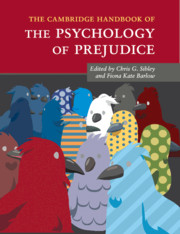Book contents
- Frontmatter
- Dedication
- Contents
- List of Figures
- List of Tables
- Notes on the Contributors
- Part I General Theoretical Perspectives
- 1 An Introduction to the Psychology of Prejudice
- 2 Evolutionary Approaches to Stereotyping and Prejudice
- 3 From Prejudice to Social Change: A Social Identity Perspective
- 4 Ingroup Projection as a Challenge of Diversity: Consensus about and Complexity of Superordinate Categories
- 5 Intergroup Discrimination: Ingroup Love or Outgroup Hate?
- 6 Intergroup Emotions Theory: Prejudice and Differentiated Emotional Reactions toward Outgroups
- 7 Intergroup Threats
- 8 Social Dominance Theory: Explorations in the Psychology of Oppression
- 9 The Dual Process Motivational Model of Ideology and Prejudice
- 10 Is Prejudice Heritable? Evidence from Twin Studies
- Part II Prejudice in Specific Domains
- Part III Prejudice Reduction and Analysis in Applied Contexts
- Index
- References
1 - An Introduction to the Psychology of Prejudice
from Part I - General Theoretical Perspectives
Published online by Cambridge University Press: 17 November 2016
- Frontmatter
- Dedication
- Contents
- List of Figures
- List of Tables
- Notes on the Contributors
- Part I General Theoretical Perspectives
- 1 An Introduction to the Psychology of Prejudice
- 2 Evolutionary Approaches to Stereotyping and Prejudice
- 3 From Prejudice to Social Change: A Social Identity Perspective
- 4 Ingroup Projection as a Challenge of Diversity: Consensus about and Complexity of Superordinate Categories
- 5 Intergroup Discrimination: Ingroup Love or Outgroup Hate?
- 6 Intergroup Emotions Theory: Prejudice and Differentiated Emotional Reactions toward Outgroups
- 7 Intergroup Threats
- 8 Social Dominance Theory: Explorations in the Psychology of Oppression
- 9 The Dual Process Motivational Model of Ideology and Prejudice
- 10 Is Prejudice Heritable? Evidence from Twin Studies
- Part II Prejudice in Specific Domains
- Part III Prejudice Reduction and Analysis in Applied Contexts
- Index
- References
Summary
What Is Prejudice?
What makes something, say a particular attitude or belief, an expression of prejudice? What defines a particular attitude as racist or sexist? We are often asked these questions by our students, reporters, and sometimes (although perhaps not often enough) by policymakers. The question of “what is prejudice?” is a difficult and extremely important one to answer. According to Gordon Allport (1954, p. 9), and many of the subsequent textbooks in social psychology and related areas, prejudice can be defined as “an antipathy based upon a faulty and inflexible generalization. It may be directed toward a group as a whole, or toward an individual because he [sic] is a member of that group.”
Allport's definition of prejudice-as-antipathy, or to use some other synonyms, prejudice-as-overt-dislike, hostility, or aversion, is consistent with many of the types of attitudes that members of the public may tend to naturally think of as being, for example, sexist, racist, homophobic, and so forth. Researchers working in the area of prejudice and intergroup relations owe Gordon Allport a huge intellectual debt for his founding work in the area. However, when it comes to a working definition of prejudice, Allport's was incomplete.
Indeed, in the introduction to On the Nature of Prejudice: Fifty Years after Allport, Dovidio, Glick, and Rudman (2005) commented that the definition of prejudice-as-antipathy was “Allport's most fundamental blindspot” (p. 10). We agree, and many of the chapters in this handbook illustrate the point. For example, Connor, Glick, and Fiske (2017) and Hammond and Overall (2017) emphasize that patronizing attitudes that position one group as weaker than the other and in need of protection (such as benevolent sexism) perform remarkably well in maintaining inequality. Similarly, Brewer's (2017) chapter highlights that disparity can arise not only as a result from outgroup hate but rather because of ingroup love. Neither of these phenomena fit a definition of prejudice-as-antipathy. However, they may sometimes have a more powerful effect on diffusing resistance to inequality and hierarchy and legitimizing violence and oppression because of the very fact that they seem caring or are focused on ingroup preservation, rather than overt anti-outgroup hostility.
- Type
- Chapter
- Information
- Publisher: Cambridge University PressPrint publication year: 2016
References
- 2
- Cited by



